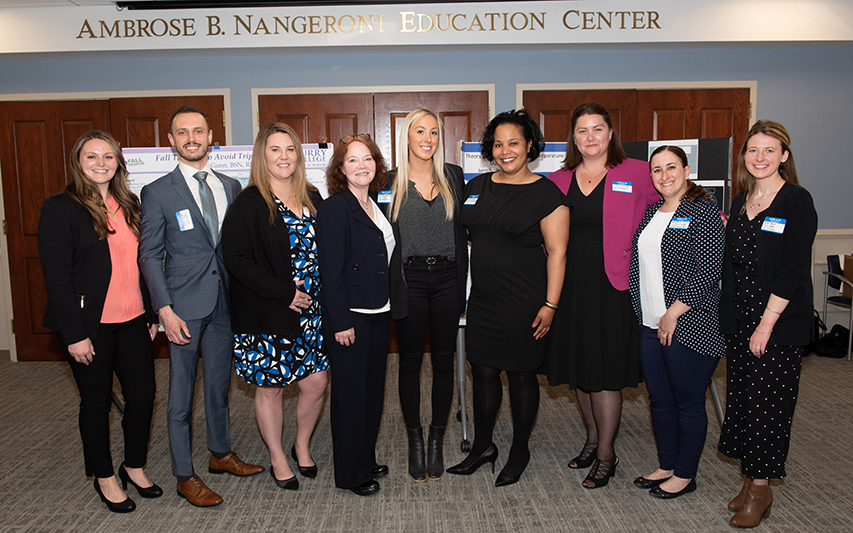
TOPICS:
Two cohorts of Master of Science in Nursing (MSN) students gathered with School of Nursing faculty and staff to present their Capstone projects during two poster sessions held at Beth Israel Deaconess-Milton on Tuesday, May 10. The students, most who are working nurses, researched issues they see in healthcare and offered solutions and best practices. Topics included boarding care of pediatric mental health patients in emergency rooms, guidelines on screening veterans for suicide, and addressing bi-lingual needs for pediatric asthma patients.
View photos from the 2022 MSN Capstone Presentations
Jennifer Daly, MSN ’22, who once worked at a drug rehabilitation center, said she noticed how “new nurses had trouble identifying when someone was in alcohol withdrawal.” Sometimes this was because patients were admitted at night, with limited staff, and nurses wouldn’t see them until morning when they came on their shifts. For her Capstone, Daly, who now works in the operating room at Boston Medical Center, put together educational materials to help nurses identify the stages of alcohol withdrawal so that patients can be treated accordingly.
Brenda Morano, MSN ’22, who works as a clinical nursing supervisor at Mass General Hospital, researched and prepared educational materials to train nurses on how to have difficult conversations with patients about advanced care planning, such as appointing a health care proxy or making end-of-life decisions. Morano said this was not part of nursing school training for many older nursing staff and there is a great need for more education in this area.
Nadia Alcindor, ’16, MSA ’22, who works as an oncology nurse for Beth Israel Deaconess, focused on cancer and intimacy. Alcindor said some nurses were embarrassed to address issues of sexual intimacy with patients and patients were nervous to bring it up. She put together educational handouts to leave in the waiting rooms, and eventually materials were also left in exam rooms. Alcindor said this encouraged both staff and patients to have the necessary conversations.
“It opened up the door to talk about sexual intimacy with cancer patients, especially with our younger patients,” said Alcindor, who noted that there has been an increase in certain cancers among younger people, such as skin and colorectal cancers.
The nurses in the second cohort session were part of a School of Nursing pilot program where the working nurses are also clinical instructors at their place of employment. They teach Curry’s prelicensure students while also earning their master’s part-time. Rachel Boswell, MSN ’22 and Joyce Hyslip-Ikkela, MSN ’22 both work as maternity nurses at Beth Israel Deaconess-Plymouth and each did their project on an aspect of breastfeeding, formula, and new mothers.
“My project focuses on educating mothers to make an informed choice on supplementing with formula when it's not medically indicated,” said Boswell. “It’s a passion project of mine to make sure the mothers get the support they need. I conducted a needs assessment at the hospital, worked with the lactation department, and then created a supplementation policy and a brochure for patients to help guide both them and the nurses.”
Hyslip-Ikkela’s project focused on mothers with gestational diabetes, where the infants are at risk for having hypoglycemia after birth; therefore, it is risky for them to receive formula in the first 24-28 hours. A better option is for these infants to receive colostrum from breast feeding, but this is more difficult for gestational diabetes patients. Hyslip-Ikkela collected data from her hospital and then developed an educational program for the providers to teach these patients how to start collecting a supply of colostrum a few weeks before the birth, which then goes with them to the hospital to feed the baby during those first one to two days.